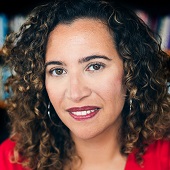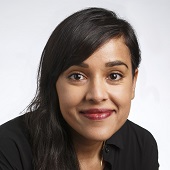|
June 30, 2020 | Watch Video
H.E. Audrey Tang, Digital Minister, Taiwan Meredith Broussard, Author and NYU Associate Professor Hibah Kamal-Grayson, Public Policy Lead, Civics and Social Impact, Google Amy Studdart, Senior Advisor for Digital Diplomacy, IRI (Moderator) On June 30th, the Women’s Foreign Policy Group hosted a virtual conversation on Combating Misinformation in Times of Crisis with Taiwan's Digital Minister Audrey Tang, author Meredith Broussard, Hibah Kamal-Grayson of Google, and moderator Amy Studdart of IRI. The speakers discussed the efforts of governments and tech companies to ensure the availability of accurate and authoritative information across social media and web-based platforms since the onset of the COVID-19 pandemic. They also addressed the role of AI in responding to this crisis--when it can be useful and when it can be unreliable or exacerbate pre-existing inequalities.  Audrey Tang, Taiwan’s “digital minister,” has been internationally recognized for her role in aiding the Taiwanese government’s response to COVID-19, increasing government transparency, and empowering grassroots movements. Using her technological expertise, she launched the Face Mask Map, a joint initiative that brought together the government, software engineers, and civic hackers to effectively allocate face masks across the country. A software developer and entrepreneur: Tang dropped out of school at age 14 to focus on coding, founded a search engine company before she turned 15, and became Taiwan’s youngest ever government minister at the age of 35 in 2016. As part of her strategy to create a ‘digital Taiwan’, she led the country’s first e-rulemaking project. She actively contributes to Taiwan’s g0v (‘gov-zero’), one of the world’s most active civic-tech communities focusing on creating tools for the civil society. | @audreyt Audrey Tang, Taiwan’s “digital minister,” has been internationally recognized for her role in aiding the Taiwanese government’s response to COVID-19, increasing government transparency, and empowering grassroots movements. Using her technological expertise, she launched the Face Mask Map, a joint initiative that brought together the government, software engineers, and civic hackers to effectively allocate face masks across the country. A software developer and entrepreneur: Tang dropped out of school at age 14 to focus on coding, founded a search engine company before she turned 15, and became Taiwan’s youngest ever government minister at the age of 35 in 2016. As part of her strategy to create a ‘digital Taiwan’, she led the country’s first e-rulemaking project. She actively contributes to Taiwan’s g0v (‘gov-zero’), one of the world’s most active civic-tech communities focusing on creating tools for the civil society. | @audreyt Meredith Broussard is an assistant professor at the Arthur L. Carter Journalism Institute of New York University and is the author of Artificial Unintelligence: How Computers Misunderstand the World. Her current research focuses on artificial intelligence in investigative reporting, with a particular interest in using data analysis for social good. Her newest project explores how future historians will read today’s news on tomorrow’s computers. A former features editor at the Philadelphia Inquirer, she has also worked as a software developer at AT&T Bell Labs and the MIT Media Lab. Her features and essays have appeared in The Atlantic, Harper's, Slate, and other outlets. She holds a BA from Harvard University and an MFA from Columbia University. | @merbroussard Meredith Broussard is an assistant professor at the Arthur L. Carter Journalism Institute of New York University and is the author of Artificial Unintelligence: How Computers Misunderstand the World. Her current research focuses on artificial intelligence in investigative reporting, with a particular interest in using data analysis for social good. Her newest project explores how future historians will read today’s news on tomorrow’s computers. A former features editor at the Philadelphia Inquirer, she has also worked as a software developer at AT&T Bell Labs and the MIT Media Lab. Her features and essays have appeared in The Atlantic, Harper's, Slate, and other outlets. She holds a BA from Harvard University and an MFA from Columbia University. | @merbroussard Hibah Kamal-Grayson is the public policy lead for Google Search's social impact verticals, including health, crisis response, civics/elections, and education. Before joining Google's Government Affairs and Public Policy team, Kamal-Grayson worked as a policy researcher at New America's Open Technology Institute, a graduate researcher at Columbia University, and an account optimizer at Google. She has also spent time at the Berkman Center for Internet and Society and the BBC’s Washington Bureau. She holds a MSc from the London School of Economics, where she won the inaugural Interaction London/Polis prize for applied media research. Her research and publications on technology issues have been cited by FCC and White House reports and covered by The Washington Post, New York Times, USA Today, and Forbes. | @hibahsays Hibah Kamal-Grayson is the public policy lead for Google Search's social impact verticals, including health, crisis response, civics/elections, and education. Before joining Google's Government Affairs and Public Policy team, Kamal-Grayson worked as a policy researcher at New America's Open Technology Institute, a graduate researcher at Columbia University, and an account optimizer at Google. She has also spent time at the Berkman Center for Internet and Society and the BBC’s Washington Bureau. She holds a MSc from the London School of Economics, where she won the inaugural Interaction London/Polis prize for applied media research. Her research and publications on technology issues have been cited by FCC and White House reports and covered by The Washington Post, New York Times, USA Today, and Forbes. | @hibahsays Amy Studdart (Moderator) is the senior advisor for digital diplomacy at the International Republican Institute and concurrently the founder and CEO of Villager, a start-up working to bring democracy into the 21st century. Previously, she was a German Marshall Fund fellow where she developed their technology policy programming, worked with the executive communications team at Facebook, and served as deputy director and fellow of the William E. Simon Chair in Political Economy at CSIS. She worked in Brussels from 2008 to 2014, first at the Carnegie Endowment for International Peace and then at GMF, where she managed the Stockholm China Forum. She has published and spoken around the world on technology’s impact on democracy and society; the rise of digital authoritarianism; and the digital economy. | @AmyStuddart Amy Studdart (Moderator) is the senior advisor for digital diplomacy at the International Republican Institute and concurrently the founder and CEO of Villager, a start-up working to bring democracy into the 21st century. Previously, she was a German Marshall Fund fellow where she developed their technology policy programming, worked with the executive communications team at Facebook, and served as deputy director and fellow of the William E. Simon Chair in Political Economy at CSIS. She worked in Brussels from 2008 to 2014, first at the Carnegie Endowment for International Peace and then at GMF, where she managed the Stockholm China Forum. She has published and spoken around the world on technology’s impact on democracy and society; the rise of digital authoritarianism; and the digital economy. | @AmyStuddart |


